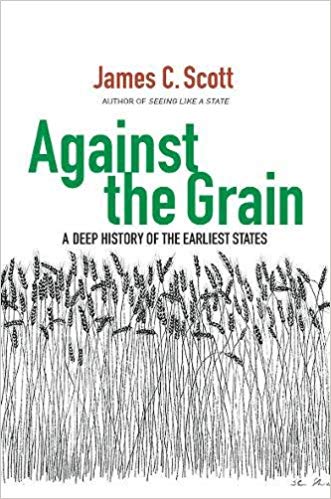 Audio book, Oct 2019.
Audio book, Oct 2019.
“Did humans domesticate wheat, or did wheat domesticate humans?”
This is one of those Joe Rogan-esque questions that has stuck with me after reading it somewhere. So I was happy to find this book which looks at the shift from the nomadic hunter-gather lifestyle to the settled agricultural life among early humans.
Scott describes 3 buckets of early human life:
Pastoralist / Hunter-gatherer:
- Largely meat based diet
- Reproduction limited by need to carry around infants
Late Neolithic Multi-Species Resettlement Camp:
- Grew some crops / depended on multiple sources of food (raised meat / local crops / foraging / fishing / raiding)
- Started to domesticate animals
- If there were pandemic diseases or crop failures, they moved elsewhere
State / Barbarian System:
- Complex division of labor allowed some members of society to not participate in food production (eg priests, government)
- Highly sensitive to crop failure, ecological change, or plunder
- Government pushes dependence on a few crops in order to tax them or have stores for re-distribution
- Sedentary lifestyle and grain-based diet improves reproduction rate (earlier onset of puberty, no need to carry kids around)
- “Barbarians” (lit: people who do not speak Greek) are in a symbiosis with the state. They alternately trade with the state, plunder it, or engage in a protection racket where they agree not to attack it or attack its enemies.
- There are no “barbarians” without state because the term implies a state-centered worldview.
- Barbarians eventually died out because they dug their own graves. They were co-opted by the state and turned against outside enemies or used for slaving.
Historical Bias towards Sedentism
Scott spends a lot of time pointing out flaws in the historiography of early states. Think about how many metaphors and loaded terms are used about early civilization:
Humans evolved from a nomadic lifestyle to an agricultural one. But is this really a higher form of existence? Early humans (especially in the multi-species resettlement camp) had an extremely wide variety of food options. They spent less time finding calories. They grew some crops, foraged, fished, and hunted. If there were any problems at a given site, they simply moved on. Doesn’t sound so bad.
If a complex settled society (eg the Incas) reverts to pastoralism it is said to have collapsed.
Scott says this bias is because you simply can’t write a history if there is no artifact or writing to look at. History is written about the kings because they leave castles, written records, and other cool things behind to study.
Why Grain?
A central question of the book is “If pre-agricultural life was so wonderful why did humans become so grain dependent?
The answer is that the rise of grains went in parallel with the rise of early states. Farming grains was beneficial for the state so the states encouraged grain cultivation whenever possible.
Let’s look at a list of properties of grains that made them attractive to states:
- They can be stored for long periods of time
- They have a high calorie to weight ratio
- It is easy to confiscate (tax) and transport
- It is infinitely divisible, making it easier to tax and distribute
- Easy to use an early currency / unit of value
- Easy to estimate yield of grain from a given amount of land and known weather conditions
- High-grain diet encourages earlier puberty, so gives a reproductive advantage to sedentism
But grain had many important disadvantages:
- Becoming overly dependent on grain means that crop failures or environmental changes could lead to
- Grain needs constant attention (weeding, plowing, harrowing, etc). This was closely connected with slavery and increases in state taxation
- Grain stores were easily plundered, leading to the state-barbarian symbiosis
So, yes, early H-Gs a better diet and “work-life balance.”And they didn’t have the energy density of grains that allowed societies to become stratified and full of non-food production roles.
